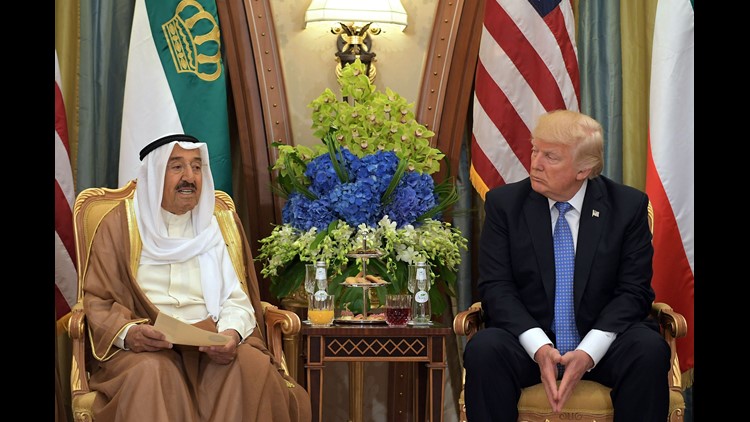RIYADH, Saudi Arabia — President Donald Trump on Sunday will look to make clear that the United States is not at war with Islam in a major speech in Saudi Arabia on Sunday, instead defining the battle against terrorist groups as a “battle between good and evil.”
In a departure from the Islamophobic rhetoric he sometimes deployed on the campaign trail, Trump will speak out against the militant, political ideology of “Islamist extremism,” according to excerpts of the speech released by the White House. Trump’s expected use of that term — rather than “radical Islam” — will send signals in this region that Trump is putting distance between Islam and the ideology that fuels terrorist groups like ISIS.
Trump’s speech Sunday will likely be met with skepticism and frustration in the Muslim world, according to experts in the Middle East who said his sudden shift in tone on Islam was unconvincing.
Trump gave his speech in Saudi Arabia, where he ditched his hard-line rhetoric from the 2016 election campaign and instead called Islam “one of the world’s great faiths.”
Here’s what experts in three Muslim-majority countries in the Middle East thought of the speech.
Jordan
Former Jordanian Justice Minister Ibrahim Aljazy said Trump’s shift in tone toward Muslims was notable.
“Trump has moved from ‘Islam hates us’ to a friendlier approach of common values and shared interests,” he said.
But Aljazy said Jordanians and others in the Muslim world had hoped Trump would deliver clearer answers on American policy in the region.
“I would not call it a constructive tone since that people in the region, particularly Jordanians, are looking for a more clear approach to the Israeli policies and an end to settlements, which may pave the way for a true two-state solution and end of occupation,” he said.
“Referencing ‘Islamic’ terrorist organizations only will not be appreciated by the vast majority of people in the region when other forces are carrying out acts of aggression, especially as Arabs and Muslims are the prime victims of these organizations,” he said.
Trump also failed to acknowledge the importance of democracy and the rule of law in putting an end to the root causes of terrorism, Aljazy said.
Iran
Hamed Mousavi, a political science professor at Iran’s Tehran University, said that Trump’s attempts to strike a friendlier tone in Saudi Arabia were hard to swallow.
“It will be met with deep skepticism in the Muslim world because Trump has been hostile and offensive to Muslims — with his Muslim travel ban, for example. All they’ve seen so far from Donald Trump is a lot of hostility,” he said.
Mousavi said that by making lucrative arms deals with Saudi Arabia, the United States has lost its ability to put pressure on Riyadh to reform Wahhabism, a fundamentalist brand of Islam that insists on a strict interpretation of the Koran.
Wahhabism is the country’s dominant faith, and in 2013, the European Parliament published a report dubbing the religion as a main cause of global terrorism.
On Saturday, Trump and Saudi King Salman bin Abdulaziz Al Saud signed an arms deal worth $109 billion, part of a broader $350 billion package of economic and defense investments over the next decade.
“I think the US needs to decide what it wants from this relationship with Saudi Arabia. Does it want the economic benefits? Or is it to fight terrorism and to fight an extreme form of Islam?” Mousavi said. “These two agendas don’t fit with each other. If Saudi Arabia buys this relationship, the US will be in no position to lecture them.”
Lebanon
Karim Makdisi, an associate professor of international politics at The American University of Beirut, said the Trump administration’s policies on the Middle East have in most respects been a continuation of the Obama administration’s.
But Trump’s speech on Sunday marked some provocative changes, he said. Most notable was Trump’s open condemnation of Iran as a nation that funds and harbors terrorists.
“What this speech appears to signal is a potential shift away from Obama’s more pragmatic policy towards Iran that resulted, most notably, in the nuclear agreement,” Makdisi said. “Trump’s vitriolic attack on Iran was matched only by his lavish praise of the Saudi king. Given the bitter Saudi-Iranian regional conflict that includes both proxy wars and sectarian bating, this shift may potentially lead to yet further violence and instability.”
Makdisi pointed out that Trump equated Hezbollah, a Lebanese political and military group made up mostly of Shia Muslims, with ISIS and al Qaeda. Hezbollah was conceived in the early 1980s primarily to fight against Israeli occupation in southern Lebanon.
“This is irresponsible on many levels,” Makdisi said of Trump’s comments.
“With Israeli rhetoric increasing against Lebanon, this does not bode well. The Lebanese will not put much stock in yet another grand speech, but they will keep an eye out for Trump’s position towards Israel’s threats against Lebanon, and any shift in US policy towards Syria.”
He said Trump’s description of a good-versus-evil conflict essentially made it official that the United States would back a Sunni force allied with Israel against terror groups.
“If this rhetoric is translated into action, the region is in for much bloodshed rather than the long-term ‘peace’ Trump spoke of,” Makdis said. “Ultimately, let us observe what the Trump administration policy will be with regard to Iran — this is the real litmus test.”
Palestinian militant group Hamas called Trump “biased” toward Israel after he labeled the organization a terrorist group in his speech.
In a press release, Hamas said it “denounces US President Trump’s fabrications in front of the Arab and Muslim kings and leaders. Trump included the Islamic Resistance movement Hamas in the terrorism list. He denied the Palestinian people the right to resist, which is a legitimate and sacred right to liberate the land and holy places.”



